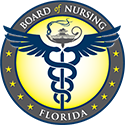General FAQs
How to I obtain a copy of my transcript?
The Department of Health/Board of Nursing uses transcripts for licensure purposes only. Pursuant to Section 456.014(1), F.S., we are unable to provide copies of school transcripts.
NCLEX Information
The 2017 NCLEX Candidate Bulletin and 2017 NCLEX Information Flyer (effective Jan. 1, 2017) is now available on the NCSBN website.
The 2017 NCLEX Candidate Bulletin is an important resource for candidates seeking licensure/registration in the U.S. and Canada. It provides information on how to register to take the NCLEX, how to schedule an appointment, the rules that they are expected to follow on the day of the exam as well as information on receiving NCLEX results. The Bulletin is available in both English and French.
The NCLEX Information Flyer provides a quick reference for important NCLEX information for candidates.
The 2017 NCLEX Candidate Bulletin and 2017 NCLEX Information Flyer can be found on the Candidate Bulletin and Information page of the NCSBN website.
What is the State of Florida doing to counteract prescription drug abuse?
In 2009, the Florida legislature adopted a new law to address the state’s growing problem with prescription drug abuse and diversion. Chapter 893.055 established new guidelines for operating pain management clinics and approved development and utilization of a Prescription Drug Monitoring Program (“PDMP”) database to collect controlled substance prescription records from dispensers.
For further information concerning PDMP, http://flboardofmedicine.gov/latest-news/prescription-drug-monitoring-program-2/
Will Advanced Practice Registered Nurses (APRNs) be required to obtain a Doctor of Nurse Practice degree?
Requiring an APRN to obtain a Doctor of Nursing Practice (DNP) would require a legislative action. Currently, there is no mandate regarding this educational requirement. You may review the APRN Consensus Model on the National Council of State Boards of Nursing (NCSBN) website for further information with your inquiry.
What is the enhanced Nurse Licensure Compact (NLC)?
In March 2016, the enhanced Nurse Licensure Compact (NLC) was enrolled into Florida law. The enhanced NLC will allow Florida’s registered nurses (RN) and licensed practical nurses (LPN) to have one multi-state license with the ability to practice in all nursing compact member states. The enhanced NLC will come into effect either when 26 states pass legislation supporting the enhanced NLC or on December 21, 2018, whichever comes first. For more information about the NLC, please visit the NLC Website.
How can I find CRNA information?
If you are looking for information on a CRNA, search under using APRN.
Do I still need a Visiting Nurse permit if I have a Multi-State license?
No, the Nurse Practice Act, Section 464.0095,FS, article 3 allows for any RN or LPN to practice as an RN or LPN in each party state, using multi-state licensure privileges, without a required nurse permit.
How can I access licensure and enforcement data about health care practitioners and establishments regulated by the Florida Department of Health?
You can use the online tools to search for licensure and enforcement data about health care practitioners and establishments. Data can be downloaded for licensees, enforcement, MQA reports and statistical data.
How can I find out about requesting an exemption?
Licensees employed or seeking employment with a health care facility licensed by the Agency for Health Care Administration may find more information regarding exemptions, and the exemption applications at https://floridasnursing.gov/resources/exemptions/.
How can I find declaratory statements?
Declaratory statements can be found at: http://www.floridahealth.gov/licensing-and-regulation/declaratory/declaratory-statements.html
How do I self report a criminal conviction?
Please visit the Florida Health Care Complaint Portal to report your criminal conviction.
How do I request a declaratory statement or variance and waiver of a Board rule?
Information on the requirements and how to file a Declaratory Statement can be found online on the Declaratory Statements page. Please note, a variance or waiver can only be granted for a Board Rule, not a Florida Statute.
How can I become a Board Member?
Board members are appointed by the Governor and confirmed by the Senate. You may apply by contacting the Governor’s Appointment Office at 850-488-9243 or by visiting www.flgov.com/eog/leadership/appointments.
Who can attend Board Meetings?
All Board meetings are open to the public and you are encouraged to attend. You may find a schedule of upcoming Board meetings on the Meetings Page)
What are the deadlines to have an item placed on the Board agenda?
Agenda items must be submitted to the Board of Nursing 30 days prior to any particular Board meeting date. Staff must have sufficient time to review documentation prior to it being placed on the agenda. If, upon review, the application for licensure is found to be complete and requires review by the Board Members, it will be placed on the next available Board Meeting. The application must be complete at least 30 days prior to the Board Meeting date.
Where can I find the minutes from the latest meeting?
The minutes from our Board Meetings can be found on our website at: Past Meeting Information and Materials
What is Florida’s Alternative to Discipline Program?
Florida’s alternative to discipline is the Intervention Project for Nurses (IPN). http://www.ipnfl.org
Who may make a report to the Intervention Project for Nurses? (IPN)
Any person suspecting impairment of a nurse’s ability to provide safe nursing care may report this nurse to the Florida Department of Health (DOH) and/or IPN. Under Florida’s Mandatory Reporting Law, all licensed nurses must report any suspected impairment in practice to DOH and/or IPN.
Will participation in the Intervention Project for Nurses (IPN) protect my nursing license from discipline by the Florida Board of Nursing?
Being unable to practice nursing safely due to use of drugs, alcohol, chemicals, a mental condition, or the possession or distribution of controlled drugs for other than legitimate purposes is a violation of the Nurse Practice Act that can result in disciplinary action taken against a nurse’s license by the Florida Board of Nursing. If the nurse has been reported only to IPN, he/she agrees to participate in IPN, and successfully completes IPN, the file is closed and held in confidence with no disciplinary action resulting. If the nurse is reported only to IPN, and does not agree to participate, or does not successfully complete IPN, then the information in IPN’s possession is forwarded to DOH, and may result in disciplinary action, if deemed appropriate. In some cases, the nurse is reported both to IPN and the DOH and in those cases, the disciplinary process proceeds and may result in disciplinary action.
Will a nurse still be able to practice nursing while participating in the Intervention Project for Nurses (IPN)?
Initially, the nurse may be required to refrain from nursing practice during the evaluation phase and any resulting treatment. The nurse may resume nursing practice when given authorization to do so by IPN or the Florida Board of Nursing. The approval for a return to nursing practice is based upon recommendations from approved treatment providers in consultation with IPN staff. Practice limitations are often required during the early phase of return to practice.
What is a declaratory statement ?
A declaratory statement is a means for resolving a controversy or answering questions or doubts concerning the applicability of statutory provisions, rules, or orders over which the board, or department when there is no board, has authority, pursuant to Rule 28-105.001, Florida Administrative Code. A petition for declaratory statement may be used only to resolve questions or doubts as to how the statutes, rule, or order may apply to the petitioner’s particular circumstances. A declaratory statement is not the appropriate means for determining the conduct of another person or for obtaining a policy statement of general applicability. A petition for declaratory statement must describe the potential impact of the statutes, rules, or orders upon the petitioner’s interests.






